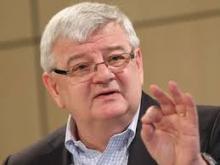You are here
The empires strike back at Europe
Feb 03,2021 - Last updated at Feb 03,2021
BERLIN — Donald Trump’s presidency is now history, which puts renewing the transatlantic relationship back on the European agenda. But there can be no return to the old, cozy dependencies of the Cold War era and the period thereafter, when America, the great protector, decided all important security matters, and Europe followed as a matter of course. To renew transatlanticism, Europe will need to make its own contribution to joint security, especially within its own geopolitical environment.
In its immediate neighbourhood, the European Union faces three former global powers that are obsessed with their past imperial glory: Russia, Turkey, and now the United Kingdom. Each has a unique relationship with Europe, currently as well as historically, and all share some commonalities.
Under President Vladimir Putin, Russia clings longingly to memories of its superpower status, when the Soviet Union was the global equal of the United States. Under President Recep Tayyip Erdogan, Turkey dreams of reprising the Ottoman Empire’s geopolitical and cultural expansion from the Balkans and the western edges of Central Asia to the eastern Mediterranean and the North African coast (Libya), all the way down to the Persian Gulf. And, finally, post-Brexit Britain is searching its soul in self-imposed (and not so splendid) isolation, even as it remains close to continental Europeans through NATO and strong cultural and historical ties.
For better or worse, the EU shares the European continent with these three difficult neighbours, and thus must work with each of them to achieve peaceful coexistence. Russia, a nuclear power, is too large and militarily powerful for Europe to manage on its own. Here, the EU will remain dependent on US protection, especially in the face of Russian threats to Eastern Europe and the Baltic States, which were made manifest with the 2014 annexation of Crimea and the war in eastern Ukraine.
But Europe’s main challenge lies elsewhere: the eastern Mediterranean, where the discovery of substantial natural gas deposits below the seabed has significantly increased the risk of a conflict between NATO members Turkey and Greece, as well as involving EU member state Cyprus. Moreover, a NATO mission to stop arms smuggling along the Libyan coast recently precipitated a dangerous confrontation between a French frigate and Turkish navy vessels, resulting in a serious diplomatic contretemps.
In fact, there is no shortage of potential flashpoints in the region, owing to competition for natural gas deposits, Turkey’s intervention in the Libyan civil war, the ancient conflict over the Aegean, longstanding demarcation issues, overflight and maritime rights, and the open question of Cyprus. These tensions, which are further aggravated by age-old religious and ethnic rivalries, have created an increasingly dangerous situation on Europe’s doorstep. Insofar as its own interests are concerned, Europe will have to deal with this problem itself.
Under Erdogan, Turkey has been pursuing expansive “neo-Ottoman” policies for several years now. Though his Justice and Development Party (AKP) government had initially attempted to accelerate integration with the West by moving toward EU accession, German Chancellor Angela Merkel and then-French president Jacques Chirac firmly closed the door in its face in 2006.
At the time, the global economic boom gave Erdogan the impression that Turkey could modernise and then re-emerge as a great power on its own, without recourse to European integration. But Erdogan completely overestimated his country’s capabilities (and still does).
Domestically, Erdogan relied on a political alliance with the Islamic Gülen movement until the coup attempt in 2016, whereupon he forged a new pact with extreme nationalists. But the change of allies did not diminish the religious component to Erdogan’s politics. He has long emphasised pursuing an Islamic path into the modern age, which represents a departure from the secular tradition established by post-Ottoman Turkey’s founder, Kemal Atatürk. This commitment has ineluctably led Erdogan away from the West and toward the Middle East.
It is now clear that both the EU and Turkey were caught in a trap of their own making: the prospect of EU membership, which will not be on the table in the foreseeable future. Unfortunately, no alternative integration mechanisms are on offer.
But Turkey and the EU cannot simply go their own ways. Europe’s markets, investment capacity and relations with Turkey’s archrivals Russia and Iran make it indispensable to Turkey; and Turkey’s geopolitical position between Europe, the Middle East, Central Asia, and the Caucasus makes it indispensable to the EU.
Aside from being the ancestral homeland of large minority populations in Germany, Belgium and Scandinavia, Turkey will continue to serve an important “bridging function” for refugee migration from Asia to Europe. It is imperative, therefore, that both sides develop peaceful ties outside of EU membership.
To be sure, the fiction of Turkey’s long-suspended EU accession process will need to be upheld for the time being; because it remains to be seen who will succeed Erdogan, formally ending the process at the current moment would do more harm than good. But as long as Erdogan is in power, coexistence is the best that can be hoped for.
Europe must not lose sight of the long game, which inevitably will center on China, not Russia or relations with post-Brexit Britain. China is already establishing a presence in Iran, and demonstrating that it has the capital, know-how, and technology to project power and influence beyond its borders. Should it succeed in turning the Belt and Road Initiative into a line of geopolitical stepping-stones, it might soon emerge at Europe’s southeastern border in a form that no one in the EU foresaw.
Europe cannot possibly want such an outcome. The “Turkish question” therefore will remain as relevant as ever.
Joschka Fischer, Germany’s foreign minister and vice chancellor from 1998 to 2005, was a leader of the German Green Party for almost 20 years. Copyright: Project Syndicate, 2021.













